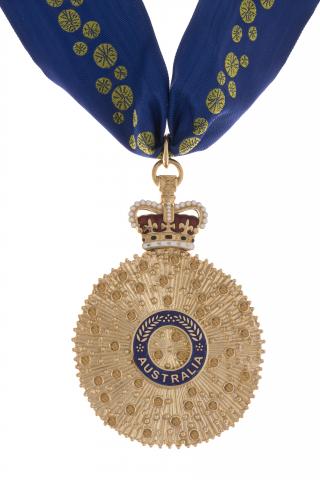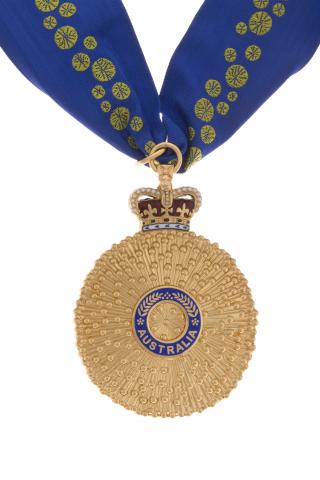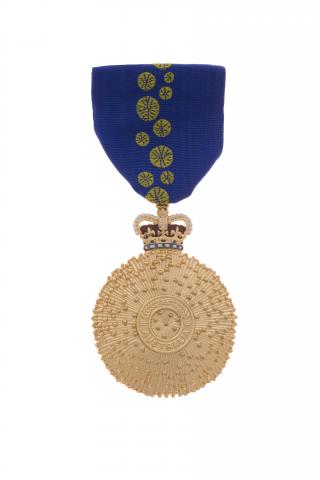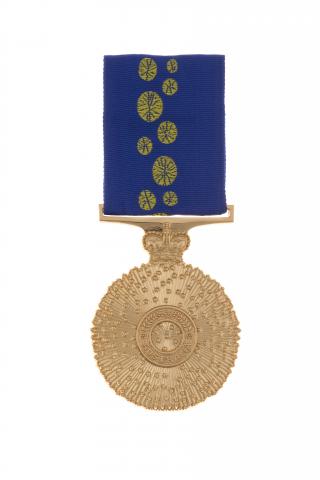The Order of Australia
Important Update - Changes to nominating
On 31 October 2025 the Australian Honours and Awards Secretariat implemented changes to the way nominations for the Order of Australia are submitted. These changes have been designed to increase efficiency.
Nominating someone for recognition through the Order of Australia has always required the provision of referees. The revised nomination form requires the nominator to include the name and email address of three referees who can comment on the nomination they have prepared.
These changes mean referees will receive an email generated by the portal, seeking their comments. Nominators will not have access to the comments provided by referees. Only after all three referees have responded to this request will the nominator be able to submit their nomination.
The nominator will be alerted by email when each referee has responded and, once all referees have responded, the nominator will need to log back into the portal to submit their nomination.
These changes apply to all new nominations and those that have not yet been submitted.
About the awards
The Order of Australia recognises Australians who have demonstrated outstanding service or exceptional achievement.
There are four levels of award, The Companion of the Order of Australia (AC), Officer of the Order of Australia (AO), Member of the Order of Australia (AM), and Medal of the Order of Australia (OAM). The Order of Australia also has a Military Division (awards in this division are recommended to the Governor-General by the Minister for Defence).
Anyone can nominate a member of the community for an award in the Order of Australia.
Nominating someone is a chance to recognise a peer for their hard-work, service and dedication. It is an opportunity to celebrate those inspiring people who make our nation what it is.
All nominations are independently researched before they are considered by the Council for the Order of Australia. This research checks the information you provide and gathers more details about the person you are nominating.
The Council for the Order of Australia considers the information and makes a recommendation to the Governor-General.
Ultimately, the outcome is based on the impact the nominee has had. Your nomination is a starting point in the process and success is not based on how well you write the nomination.
Nominations are made via the online Portal.
If you need help to complete your nomination form, call (02) 6283 3604 (business hours – AEST/AEDT) or email honours@gg.gov.au.
Eligibility
The Order of Australia celebrates Australians who make an outstanding contribution to the community – at the local, national or international level.
The Council decides who should be recommended based on a person’s actions, achievements and the difference they have made. People who are recognised go above and beyond what is reasonably expected (or could be expected) to make life better for others.
To be eligible for the Order of Australia, a nominee must:
- Be alive at the time their nomination is received
- Be an Australian citizen or permanent resident (see note below)
- Have not been recognised through the Order of Australia in the last five years.
Non-citizens and permanent residents may be recognised through honorary awards. Recognition for non-citizens is the responsibility of the Department of the Prime Minister and Cabinet.
Australians from all walks of life are recognised through the Order of Australia. They may:
- Be a volunteer whose service is over and above the contributions of other volunteers
- Have made an outstanding contribution within their professional field (whatever that is)
- Have done both – made an impact in their job/s and contributed as a volunteer. Usually, recipients have contributed in many ways.
It doesn’t matter what their background is or what type of work they do, if someone makes a positive difference they may be recognised.
You can read recipient stories to learn about some of the different ways people have contributed.
Generally, someone who has been nominated and was unsuccessful, will not be considered for another five years (unless in exceptional circumstances).
Completing the nomination form
Nominee details
Purpose
We use the details you provide about your nominee to ensure we accurately identify them. This is important, as we independently research every nominee.
We also use the details you provide to contact the nominee, if they are recommended for an award, to ask if they are willing to accept it.
Information required
You must answer any questions are marked with an ‘*’. For some, you have the option to select ‘I do not know’.
You are asked to provide:
- Name*
- Gender*
- Date of birth (or an age range)*
- Any contact details you know (including address, phone number and email)*
- Any qualifications, honours or awards your nominee has received
- Types of qualifications, honours or awards could include: trade or academic qualifications (for example, teacher, builder or doctor), award/s from an organisation, Council or another body, or recognition through other honours systems
- Your nominee does not need to have a qualification or another honour or award to be recognised in the Order of Australia. Providing this information helps with the research process.
- If the nominee uses post-nominals
- Post-nominals are letters after a person’s name that show they have a qualification, role or high-level award. Examples include BSc, PhD, MBA and MP. You might find post-nominals in someone’s signature block on emails and letters, business cards or their social media profiles.
- Your nominee does not need to have post-nominals to be recognised in the Order of Australia. Providing this information helps with the research process.
Responses to the next questions about your nominee’s background do not have an impact on the outcome of your nomination. We ask for information about ancestry and disability to help us see if all parts of the community are represented in Australia’s Honours and Awards system.
You are asked to provide (if you know):
- If your nominee is of Aboriginal and/or Torres Strait Islander origin
- Whether they speak a language other than English at home
- Their cultural ancestry or background
- Whether they have an ongoing disability
Nomination details
Purpose
This is where you tell us about what your nominee has done that is outstanding. Provide as much information as you can. We use the information you provide as a starting point for research.
Every nominee is independently researched to produce a complete picture of their service and the difference they have made. This full package of information is used by the Council for the Order of Australia to recommend the outcome of the nomination.
Information required
You are asked to provide:
- How you know the person you are nominating*
- If you know them personally, describe your relationship with them
- If you don't know them personally, briefly tell us how you know of them. For example, you might have seen what they do to help others or read about their good work through media coverage or heard about them from someone else.
- A statement about why you think your nominee should be recognised (see below)*
- You can include attachments to support your nomination
- For example, you may attach copies of your nominee’s resume, news stories about their contribution, evidence of other types of recognition or achievements
- You should not include statements from referees (see guidance on referees)
Answering the question 'why should the nominee be recognised within the Order of Australia?'
Every nomination is different. There is no right or wrong way to tell us why you think your nominee should be recognised. If you don’t know all the details, that’s ok.
- Provide as much information as you can
- You can use dot points
Tell us how your nominee has gone above and beyond, to make life better for others.
- Give examples of the good work they have done.
- Describe how they have made a difference. Rather than just saying, 'they served in this position for X years,' tell us what they did that was above and beyond, e.g., 'as <their position> they achieved...'
The below questions are prompts to help you consider how to respond (you do not have to answer any/all of them):
- How does your nominee’s role and contribution stand out from others?
- What was it like before they started their work? How has the situation improved?
- What difference did they make to the community? Was their impact at a local, national and/or international level?
- What obstacles or challenges did they overcome? How did they go above and beyond?
- How have they earned the respect of others and become a role model in their field?
- What do they do that puts them in the top level of achievement in their field?
Referee details
Purpose
The contact details that you supply will be used to email referees, seeking comments, via the Portal. You should not directly seek statements from referees.
Your name and email address will be provided to the referees you include in the nomination form.
We may also identify and contact other people who can comment on your nominee’s contribution.
As detailed in our privacy policy, we will not share referee comments with you and/or the nominee.
Information required
You need to provide the name and email address of three referees and include the following:
- Title and name*
- If the referee uses post-nominals - the rank of title of a referee does not affect how we consider their comments
- The business or organisation associated with the referee and their position*
- Sometimes we may approach someone else in the same organisation for comment.
- THe rank, title or position of a referee does not affect how we consider their comments.
- How they know the nominee*
- A referee is anyone who can comment on the person you are nominating. They do not need to personally know the nominee, but should have knowledge of their contribution.
- A referee could be a peer or someone who knows the nominee well, a member of an organisation where the nominee worked or volunteered, or an industry expert.
- Any other contact details.
Your details
Purpose
We use the contact information you provide to:
- Send an acknowledgement confirming receipt of your nomination. This advice will include a reference number.
- Get in touch with you if we need more information or clarification.
- Let you know when each of your referees have submitted their comments (you will not be able to read their comments).
- Let you know after all the referees have responded, when it is time to log back into the portal to submit your nomination.
- Advise you once your nomination has been finalised.
Information required
You are asked to provide:
- Name and title*
- Gender*
- Date of birth*
- If you have post-nominals - providing this information allows us to address you correctly
- Your contact details*
- Your country of birth*
- If you are of Aboriginal and/or Torres Strait Islander origin
- Whether you speak a language other than English at home
- Your cultural ancestry or background
- Whether you have an ongoing disability.
Application declaration
Purpose
We use this information to:
- Confirm the information you have provided, to the best of your knowledge, is true and correct.
- Improve the nomination process.
Information required
You are asked to provide:
- Confirmation the information you have provided is, to the best of your knowledge, true and correct.
- Where you heard about the Order of Australia - options include word of mouth, media (including socials), an event, website, google, other.
- Whether there was a specific prompt of event that inspired you to nominate - your insight could help us promote the Order of Australia to people who have not previously considered nominating.
- Feedback on the form.
Medals and descriptors
| Individuals are appointed a Companion of the Order of Australia (AC) for eminent achievement and merit of the highest degree in service to Australia or to humanity at large | |
| Individuals are appointed an Officer of the Order of Australia (AO) for distinguished service of a high degree to Australia or to humanity at large | |
| Individuals are appointed a Member of the Order of Australia (AM) for service in a particular locality or field of activity or to a particular group. | |
| The Medal of the Order of Australia (OAM) is awarded for service worthy of particular recognition. |
Details
More detail is available in the Order of Australia handbook. The book includes:
- History, eligibility and nomination details
- Letters Patent, Regulations and Determinations
- Images and descriptions of what each award looks like
- Guidance on how decorations are worn.




